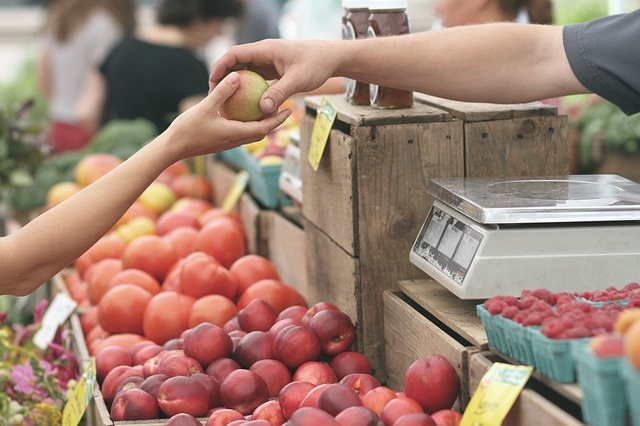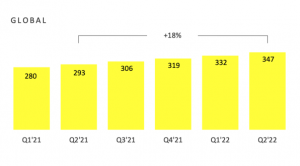— September 24, 2017

Pexels / Pixabay
Small businesses are always looking for ways to increase revenue and grow profits. One method a lot of companies are turning to is local farmer’s markets and festivals, which are popular all over the country. If you’re interested in pursuing these “pop-up” events in order to supplement revenue, there are a few things you need to know in order to have success.
Local Markets = Major Opportunity
Regardless of where your business is located, chances are, there are farmer’s markets, festivals, and fairs in your immediate community. Over the last few years, local markets have risen to prominence as customers seek out fresh, local goods. But what you may not realize is that this creates an opportunity for you.
Food businesses are most conducive to these types of markets. Local markets obviously emphasize the “local” aspect of the product – something that is closely identified with freshness and quality – which attracts customers and increases the likelihood of purchase.
But you don’t have to be a food business to capitalize on local markets. Many farmer’s markets and festivals allow other businesses to join. If you create some type of local good or handcrafted product, you shouldn’t have much trouble finding a spot. Even if your products aren’t local, they may be unique enough to warrant inclusion. It all depends on the rules and stipulations individual markets place on vendors.
You’d probably have trouble relying on local markets as your primary stream of revenue, but they can provide a nice seasonal boost from time to time. In addition to the “local” aspect that attracts customers, markets work well because they typically require very little financial input. Aside from the time investment, you might have to pay a small fee for your booth. Other than that, the market does the adverting and promotion for you. All you have to do is show up.
Local markets also provide an awesome opportunity for engagement. If you’re accustomed to selling online, the chance to get in front of your customers, face-to-face, is invaluable. Not only does it drive up sales numbers, but it helps you build trust.
7 Sales Tips for Success at Local Farmers Markets and Festivals
The key to success at local markets is to master the art of selling. While easier said than done, you can use these tips to increase your chances of being profitable.
-
Study Other Vendors
The very first step is to visit a few markets and check out what the most successful vendors are doing. Grab a spot in the middle of the chaos and just watch. Watch for an extended period of time – not just a couple of minutes. The longer you watch, the more you’ll get a sense of what they’re doing.
In almost every case, you’ll find that the most successful vendors are proactive and interactive. They don’t just sit behind their booth and wait for people to come to them. They stand out in front, shake hands, make small talk, and actively sell their products.
The best thing is to study vendors who sell products that are similar to yours. You may even want to approach them and act like a normal customer. Take notes on how they interact with you, what sort of sales pitch they give, what answers they provide to your questions, etc. Even details like packaging and payment processing are worth taking into account.
-
Know What Sets You Apart
At crowded markets, you’ll find there are a lot of the same booths with people selling identical products. If you’re going to be successful, you have to find a way to differentiate what you’re selling.
The key is to know what sets you apart. If your products are the same, what is it that makes you stand out? It could be a lower price, creative packaging, the personality of your staff, or your brand name.
If someone approaches you and asks you why they should choose you over the vendor two booths down, you should be able to quickly and succinctly provide a satisfactory answer. If you can’t, then you’re just going to blend in.
-
Accept as Many Payment Methods as Possible
Selling at markets, festivals, and fairs is beneficial for a number of reasons, but one perk is that it tears down inhibitions and increases the likelihood of purchase. There’s something about being in a unique shopping environment that makes people more likely to purchase things than if they were just walking through the mall or surfing the web.
You have to take advantage of this situation. The easier you can make it to purchase your products, the better. There should be as little friction as possible; one way you can smooth things over is by accepting multiple payment methods.
Accepting cash is fine, but you’ll do far better if you also accept cards and virtual payment methods. Thanks to the growth of POS solutions, it’s incredibly easy to accept multiple payment methods without cutting into your profits. For example, Shopify offers card readers that process chip, contactless, and magnetic stripe cards while charging rates as low as 2.4 percent per transaction. If you process a $ 100 transaction, $ 97.60 is going in your bank account. Not bad!
-
Design an Eye-Catching Booth
Booth design plays a significant role in sales success at these events. When you analyze the most successful vendors, you’ll notice that their booths are works of art. From signage placement to inventory selection, everything is carefully manipulated. Here are a few pointers:
- Don’t overload your booth with inventory. Only putting out a select number of products at a time will promote scarcity and encourage customers to purchase now, versus later.
- Put your brightest colored products at the front of your booth and try to contrast colors as much as possible. The human eye can see blocks of color from far away and will be drawn to them.
- Keep your booth clean. Nobody wants to walk up and see trash, scraps, and disorganization. A clean booth allows people to see all of your inventory and develops positive associations surrounding your brand.
- Clearly label prices. There’s nothing more frustrating for a customer than to have to ask for a price. Transparency on this front goes a long way towards building trust.
You’ll get a feel for what works after your first couple of times. Just make sure you pay attention to the details.
-
Give Out Samples
If at all possible, try giving out samples of your products. This is obviously slanted towards food businesses, but it can work in other niches, too. For example, if you sell high-end dress shoes, you can have a swath of the leather material cut up into pieces. On the backside, you could print your brand name and contact information.
Samples work because they’re memorable. When you engage a customer’s senses, they’re much more likely to be moved to action. If nothing else, be sure you have some business cards and marketing materials available to hand out. If you can leave a market with more people recognizing your brand than before, that’s a win.
-
Build Relationships
Success at local markets depends on relationships. Sure, your products sell, but most customers will be drawn to (or away) from you because of your personality and the experience you provide them.
Relationship building is good for business in general, but it’s especially powerful when it comes to local markets. Even if you don’t close a sale today, there’s always a chance that a relationship now could turn into a profitable transaction in the future. Keep this in mind and never consider time talking with customers as “wasted.”
If you aren’t a particularly outgoing or social person, it might be better to put one of your more personable employees in your booth. You want someone who represents your brand well and isn’t afraid to engage people.
-
Keep Learning
You might have success with your first local market or festival, but don’t be surprised if you come away with less than stellar sales numbers. A lack of sales the first few times around isn’t indicative of poor quality products. Instead, it should tell you that you probably aren’t doing a good enough job of being visible and engaging customers.
Success at these sorts of events is all about experience. The more experience you have, the more you’ll pick up on little things that positively and negatively impact sales. Eventually, you’ll find your sweet spot and come to understand what your target market likes, how much they’re willing to pay, and what sort of sales tactics work.
Don’t Miss This Opportunity
While we’ll soon be entering the colder months of the calendar year – when most local markets shut down and wait for the return of warmer months – now is a good time to do some research and compile a list of nearby markets, festivals, and fairs that could be good options for you next year. Many have application periods and specific requirements, so make sure you do your due diligence and plan ahead.
Business & Finance Articles on Business 2 Community
(44)






